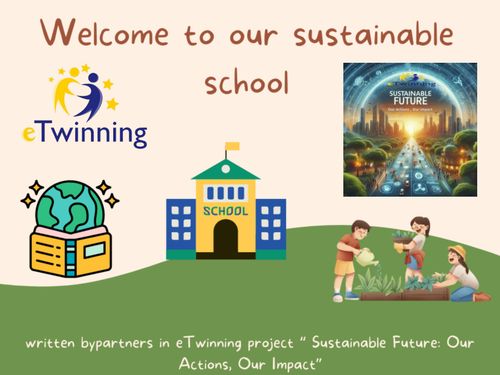In our latest lesson on sustainability, Class 7 pupils explored what makes a sustainable school.
As Eco Agents and Eco Avengers, some joined forum discussions exchanging ideas on how schools can become more eco-friendly:
- In schools we can use drainage to collect rain water for plants because that water is better for plants than tap water.
- In schools, students and teachers use paper and a lot of it goes to trash. We can renew old paper and use it many times.
- The teachers can organise the class where students will learn how they can contribute the eco schools and the sustainable future of the schools.
- The technologies will be eco and use electricity. There will be solar panels which collect energy for all electricity in school for better future.
- For every tree cut down, we should plant a new one. We should replace normal trash bins with recycling ones. We should encourage others to recycle and care for plants.
- I think the perfect green school would be if pupils followed a few rules.
Number one: instead of throwing away the paper bags from their lunches they would recycle them.
Number two: pupils would receive a back-to-school kit from recycled bottles, plastic bags etc.
Pupils and Teachers would certainly not be turning on the lights when its daytime, when the sun sets, they can turn on their power-saving LED lights.
In every classroom will be open windows for natural sunlight and a plant for more oxygen.
and how we can set composting stations in our school gardens:
- We can find a place in the shadow and put some compost bins there. Then, we can put our leftovers and orange and banana peels in the bins.
- Younger children have lunch at school, so we can ask the woman who works in the kitchen to put stale bread or leftovers in the bins too and help us make compost for our school garden.
They also shared their ideas of small actions to help the environment:
- First step to help the environment is when we cut trees, for each tree we cut down we plant a new one. Also, every school should add a recycling bin instead of normal bins and encourage students to throw their trash into those bins. These changes could help increase the number of trees and there will be less trash on the ground in school yards. I think politicians should start encouraging ppl to start throwing their trash into recycling bins. These small changes could really help the environment and clean up school yards.
- I personally think that if we stopped cutting trees and instead planted more would help the environment. At home I could turn the lights off when not needed, close the tap water when I'm not using it, so I can save water. A new habit I could start today is to start a charity work, many people would gather up and clean the streets, lakes, rivers, cleaning the whole city and planting plants like trees, flowers etc. I would personally call it the Plantvengers.
Others imagined themselves in a sustainable school, described classrooms and wrote diary entries describing a day in such an eco-friendly environment. They also designed accompanying images using AI.
Pupils then brainstormed their ideas and came up with 5 highlights of a green classroom. Finally, they used GravityWrite to write the lyrics, and Suno AI to create a pop, uplifting song.
Hopefully, these activities, inspired by our Sustainable Future: Our Actions, Our Impact eTwinning project, helped pupils think critically about their role in creating a better, greener tomorrow.





























